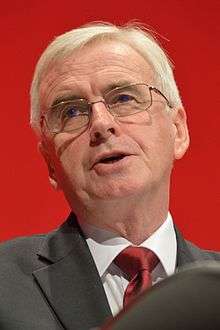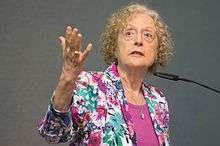Basic income in the United Kingdom
Basic income has been discussed in United Kingdom for much of the 20th and 21st century. UK organisations based around basic income include Basic Income UK, which promotes the scheme, and The Citizen's Income Trust, which promotes debate around the subject. Major British political parties that include basic income on their agenda include: the Green Party of England and Wales, the Scottish National Party and the Scottish Green Party, while Shadow Chancellor John McDonnell is said to be a supporter of basic income.
History (from Thomas Paine to year 2000)
Thomas Paine: Agrarian Justice
Thomas Paine, an English-American philosopher and revolutionary, proposed a system whereby all citizens, when reaching adulthood, should be given an equal amount of money from the state. The idea was developed in Agrarian Justice, published 1797. The basic philosophical idea behind the proposal, explained in the book, was the contention that in the state of nature, "the earth, in its natural uncultivated state... was the common property of the human race". This contemporary and fellow pamphleteer, Thomas Spence, responded with a proposal that more closely fits the contemporary definition of basic income.[1]
Speenhamland
The Speenhamland system was a form of poverty relief in England at the end of the 18th century and during the early 19th century. It started in the village of Speenhamland, but soon spread to most parts of the country. William Pitt the Younger tried to have the system implemented nationally but failed. Although it has one similarity to basic income, in that theoretically everyone was eligible, it included work conditions and supervision that made it very different from basic income.[2]
1920s and 1930s

Even though basic income and related ideas had been proposed a few times before the 1920s (most notably Bertrand Russell in 1918[3]), it was not until then that a social movement seems to have started around the idea. Valter Van Trier has described this movement, which started in United Kingdom, in his book Every One A King.
The idea of basic income was revived prominently by Dennis Milner and his wife Mabel Milner in their pamphlet Scheme for a State Bonus: A rational method of solving the social problem published in 1918. Following this publication, the so-called "State Bonus League was formed in july of the same year. The League pushed the idea inside the Labour Party, which dedicated several hearings at the National Congress in 1920 and 1922, but the idea was eventually rejected.[4]
At the same time Major C.H. Douglas, a British engineer and social philosopher, developed a new economic philosophy which he labelled Social Credit. At the heart of the philosophy was a firm belief in the importance of individual freedom, but also that the monetary system had to be changed so that the market system could function properly. In short he combined monetary reform and basic income.
1940s
The Beveridge report, published in 1942, stated that social insurances should be the main system in society for economic security. Besides that the report also proposed a selective system for those without access to social insurances. Beveridge himself did not like means-testing and selectivism, because it created high marginal tax rates for the poor, but he nevertheless thought that it was a necessary complement. After the war the "Beveridge-model" became the guiding principle for the welfare state, both in Britain and internationally. Lady Juliet Rhys Williams proposed the "New Social Contract" as an alternative to the Beveridge Report. In short she proposed basic income in the form of a negative income tax, except that she also recommended a work test.
1950s-2000
In 1972 the Cabinet of Edward Heath put forward a proposal for a tax-credit scheme which resembled a citizen's income in some ways but did not cover the whole of the population. In 1979 child benefit which is a citizen's income for children in all but name was introduced.
Contemporary debate and development (2000-)

A system of basic income is supported by the Green Party of England and Wales,[5] the Scottish National Party[6] and the Scottish Green Party.[7] For a period the Liberal Democrats also accepted it as official policy, but they have since modified their support.[8]
Shadow Chancellor John McDonnell is said to be a supporter of basic income[9] and on 16 February 2016 said that universal basic income is "an idea we want to look at".[10] Writing in The New Statesman on 17 February, Labour MP Jonathan Reynolds argues in its favour, (1) as a policy for coping with "inevitable but fundamental economic change," (2) as an alternative to "the bewildering complexity of our welfare system" when "people move frequently into and out of work", and (3) as a "platform from which [people] might fulfil their potential".[11]
In 2015 the London-based RSA (Royal Society for the encouragement of Arts, Manufactures and Commerce) launched its own proposal for Basic Income entitled "Creative Citizens, Creative State"[12] which advocated replacing a swathe of UK means-tested benefits with a single universal payment as a response to the changing landscape of work and an ageing population.
There are also several critics. Nick Boles, Tory, is one of them. According to Boles the talk of basic income as a response to the rise of robots is “dangerous nonsense”. The main argument against basic income for the Conservatives, he argues, should be that it is morally wrong. In his forthcoming book Square Deal he writes: “Mankind is hard-wired to work. We gain satisfaction from it. It gives us a sense of identity, purpose and belonging … we should not be trying to create a world in which most people do not feel the need to work.[13]
Academic debate

.jpeg)
Several British academics have been involved in the basic income debate. Among them the following:
- James Meade, a left-leaning economist and winner of the 1977 Nobel Memorial Prize in Economic Sciences, took part in the basic income discussion from time to time. In his last books Full Employment Regained and Agathopia he returned to the question.
- Guy Standing has been very active in the debate since the 1980s. He is now especially well known for his theory about the so-called precariat, a new social class which he thinks is growing because of globalisation, and that this development is yet another strong argument for why basic income should be implemented.[14][15][16]
- Carole Pateman, a British political scientist, has declared that she sees basic income as a fundamental human right. For the system to reach its full potential, however, it is important that the level is not set too low.
Organisations
The organisation Basic Income UK is "a collective of independent people promoting unconditional basic income as a progressive social policy for the United Kingdom, and beyond".[17]
"The Citizen's Income Trust promotes debate on the desirability and feasibility of a Citizen's Income by publishing a newsletter and other publications, maintaining a library of resources, and responding to requests for information".[18] It was founded in 1985 as the Basic Income Research Group and lager changed its name to CIT. The current Director is Malcolm Torry, who is also the General Manager of Basic Income Earth Network (BIEN).
Chaired by Willie Sullivan, the Citizen’s Basic Income Network Scotland "is a new organisation set up to raise awareness of the benefits that a Basic Income would bring to Scotland".[19]
See also
References
- ↑ Marangos, John. "Two arguments for Basic Income: Thomas Paine (1737-1809) and Thomas Spence (1750-1814)". History of Economic Ideas.
- ↑ http://sociology.ucdavis.edu/people/fzblock/pdf/PAS252272.pdf, Block, Fred and Somers, Margaret (2003). "In the Shadow of Speenhamland: Social Policy and the Old Poor Law". Politics & Society: 1–41.
- ↑ "History of basic income | BIEN". BIEN. Retrieved 2017-05-27.
- ↑ [Who framed social dividend? https://www.uantwerpen.be/images/uantwerpen/container1244/files/TEW%20-%20Onderzoek/Working%20Papers/SESO/1989/SESO-1989-006%20(230).pdf]
- ↑ Green Party calls for Basic Income
- ↑ "SNP conference backs universal basic income for independent Scotland". The Independent. 15 March 2016. Retrieved 15 March 2016.
- ↑ http://www.scottishgreens.org.uk/news/show/4580/citizen-s-income-key-to-beating-the-poverty-trap
- ↑ George, Vic; Miller, Stewart, eds. (1994). Social Policy Towards 2000: Squaring the Welfare Circle. London: Routledge. p. 95. ISBN 1136138528.
- ↑ "United Kingdom: Basic income supporter John McDonnell becomes shadow chancellor". Basic Income Earth Network. 18 September 2015. Retrieved 18 March 2016.
- ↑ "Labour Party considering universal basic income policy, shadow chancellor John McDonnell says". The Independent. 17 February 2016. Retrieved 18 March 2016.
- ↑ "How I learnt to stop worrying and love Basic Income". The New Statesman. 17 February 2016. Retrieved 18 March 2016.
- ↑ "Creative Citizens, Creative State". Archived from the original on 26 March 2016. Retrieved 28 July 2016.
- ↑ Tory MP condemning basic income on moral grounds
- ↑ Britain's labour figures hide the real hours we work every day, The Guardian, Aout 2012
- ↑ Guy Standing: the precariat is growing Angry
- ↑ Why the precariat requires a basic income, Conference at Ljubljana
- ↑ About us. Basic Income UK (official website). Retrieved 12 December 2017.
- ↑ http://www.citizensincome.org/
- ↑ "Citizen's Basic Income Network Scotland - SC046356". Citizen's Basic Income Network Scotland - SC046356. Retrieved 2017-05-27.